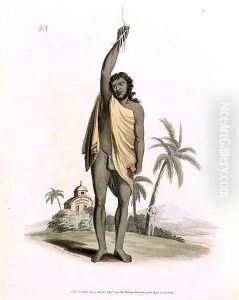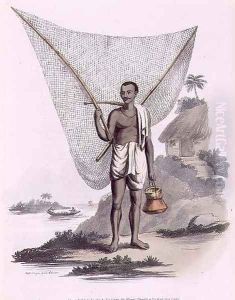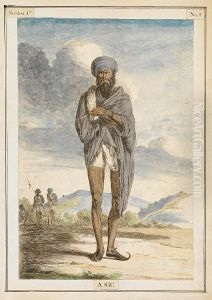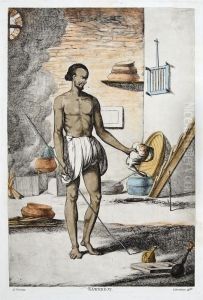Solvyns, Franz Balthazar Paintings
Franz Balthazar Solvyns, a Belgian artist and engraver, was born in 1760 in Antwerp, Belgium. He is most renowned for his detailed and insightful portrayal of the people, cultures, and landscapes of India during the late 18th and early 19th centuries. Solvyns's work is considered invaluable for its ethnographic accuracy and artistic merit, offering a unique glimpse into the life in India during the period of early European colonization.
Solvyns moved to Calcutta (now Kolkata), India, in 1791, where he spent the next several years. His move was motivated by both the spirit of adventure and the opportunity to explore and document the rich cultural heritage of the Indian subcontinent. During his time in India, Solvyns developed a keen interest in the daily lives, customs, and traditions of its people, which became the central theme of his artistic work. He produced a series of etchings titled 'Les Hindous', which was published in four volumes between 1808 and 1812. This work comprised over 250 etchings and is considered his magnum opus, capturing the essence of Indian society, its diverse people, professions, festivals, and rituals with an unprecedented level of detail and sensitivity.
Solvyns' methodology was meticulous and immersive; he spent considerable time interacting with local communities, understanding their ways of life, and then painstakingly reproducing these observations in his etchings. Despite facing financial difficulties and limited recognition during his lifetime, his work has gained considerable acclaim posthumously. Scholars and art historians regard Solvyns as an ahead-of-his-time ethnographer, whose work provides a critical, visual historical record of India at a time when such documentation was rare.
After returning to Europe in the early 19th century, Solvyns continued to work on his collection and sought to publish his findings. His later years were marked by efforts to gain recognition for his work among the European audience, but he struggled against financial and logistical constraints. Franz Balthazar Solvyns died in 1824, leaving behind a legacy that would only be fully appreciated decades later. Today, his etchings serve not only as works of art but also as important anthropological and historical documents, offering insights into the cultural dynamics of early modern India.



